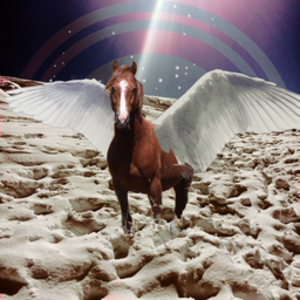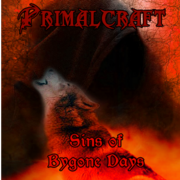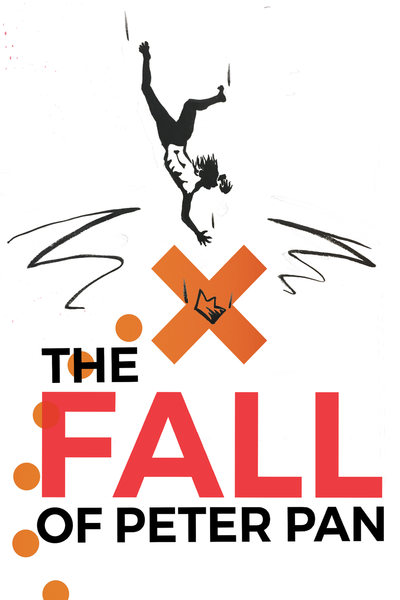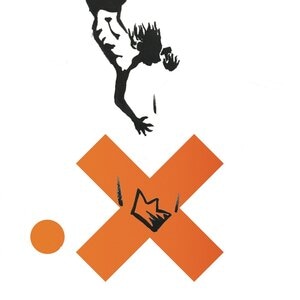Mrs. Darling gave another squeak of fear, and as if in answer to a bell, the nursery door opened and Nana entered, returned from her evening out. She had been indulging herself by watching the greyhound races. Nana growled and sprang at the boy, who hurled himself away through the window, the little light following at his heels. Again Mrs. Darling screamed, this time in distress, for she thought he was killed, and she ran down into the street with a lit taper to look for his crumpled little corpse. It was not there. She searched around, and in the black sky she could see nothing but what she thought was a shooting star, though it would have to have been very bright to shine through the smoky air of London that night.
She returned to the nursery, and found Nana holding something in her teeth, which proved to be the boy’s shadow. As he leapt out the window Nana had closed it quickly, and his shadow had not had time to get out; slam went the window and snapped it cleanly off. Together they examined the shadow, but it was quite ordinary, and Nana suggested they hang it out at the high nursery window, so that the strange boy could come back to claim it without troubling the children.
But Mrs. Darling could not leave it hanging out at the window; it looked so like washing and lowered the whole tone of the house. She thought of showing it to Mr. Darling, but he was not yet due home, and it seemed a shame to trouble him; besides, she knew exactly what he would say: “It all comes of having a dog for a nurse.” And then they would chase that conversation back and forth, battling Mr. Darling’s social insecurities on the one hand, and their monetary ones on the other, until the ideas were quite tired again and desired to be put aside till later.
She decided to roll the shadow up and put it away carefully in a drawer, until a fitting opportunity came for telling her husband, though as with many things we place in a safe place, it was almost instantly lost and forgotten.
The opportunity came a week later, on that never-to-be-forgotten Friday.
“I ought to have been specially careful on a Friday,” Mrs. Darling used to say afterwards to her husband, while perhaps Nana was on the other side of her, holding her hand with one work-roughened paw. “It was the thirteenth, after all. I should have taken precautions.”
“No, no,” Mr. Darling always said, “I am responsible for it all. I, George Darling, did it. Mea culpa, mea culpa.” He had had a classical education, and a love of reading histories of the martyrs.
“If only I had not accepted that invitation to dinner at 27,” Mrs. Darling said, “but I had been wanting to see them socially for some time.”
“If only I had not poured my medicine into Nana’s bowl,” said Mr. Darling, “though it is so very loathsome.”
“If only I had pretended to like the medicine,” was what Nana’s wet eyes said.
“My abominable liking for parties, George.”
“My fatal lack of humour, dearest.”
“My touchiness about trifles, dearest master and mistress.”
Then one or more of them would break down altogether into broken sobbing; Nana at the thought, “It’s true, they should not have employed a dog for a nurse.” Many a time it was Mr. Darling who put the handkerchief to Nana’s weeping old eyes.
“That fiend!” Mr. Darling would cry, and Nana’s bark was the very echo of it, but Mrs. Darling never upbraided Peter; there was something in the right-hand corner of her mouth that wanted her not to call Peter names. There is even the possibility that she had rediscovered the secret place in her mind, and was again using it as she should.
They would sit there in the empty nursery, their faces haggard, recalling every smallest detail of that dreadful evening. It had begun so uneventfully, so precisely like a hundred other evenings, with Nana putting on the water for Michael’s bath and carrying him to it on her back.
“I won’t go to bed,” he had shouted, still believing sincerely at three years old that his opinion was the deciding factor on a subject, “I won’t, I won’t. Nana, it isn’t six o’clock yet. I shan’t love you ever, Nana. I tell you I won’t be bathed! No! No, no, no!”
Then Mrs. Darling had come in, wearing her white evening gown. She had dressed early because John so loved to see her in her gowns, with the necklace George had given her. She was wearing Wendy’s bracelet on her arm; she had asked for the loan of it. Wendy loved to lend her bracelet to her mother, for it was no use to her unless they were playing at pirates and treasure. When Mrs. Darling had it, it was sure not to be lost, and then Wendy would be saved sitting through a scolding.
She had found her two older children playing at being herself and Father on the occasion of Wendy’s birth, and John was saying:
“I am happy to inform you, Mrs. Darling, that you are now a mother,” in just such a pompous tone as Mr. Darling himself may have used on the real occasion. Wendy pulled a face at him, but had obligingly danced with joy, just as the real Mrs. Darling must have done, if she were at all capable of dancing.
Then John was born, with the extra pomp that he received due to the birth of a boy, and Michael came from his bath to ask to be born also, but John said quite brutally that they did not want any more. Wendy boxed his ears, mainly for the pomp and a little for making Michael sad.
Michael had begun to cry. “Nobody wants me,” he despaired, snub nose running, and of course the lady in the evening dress could not stand that.
“I do,” Mrs. Darling said, “I so want a third child.”
“Boy or girl?” Asked Michael, looking up hopefully.
“Boy.”
Then he had leapt into her arms. Such a little thing for Mr. and Mrs. Darling and Nana to recall now, but not so little when it was etched in their memories as Michael’s last night in the nursery.
They labour on with their recollections, against the contrary winds of emotion.
“It was then that I rushed in like a storm, wasn’t it?” Mr. Darling would say, scorning himself; and indeed he had been like a tornado.
He, too, had been dressing for the party, and all had gone well with him until he came to his tie. It is an astounding thing to confess, but this man, though he knew about long-term interest rates and shares, had no actual mastery of his tie. Sometimes the thing yielded to him without a contest, but there were occasions when it would have been better for the house if he had swallowed his pride and used a clip-on tie, for it would have spared them all a real fit of temper.
This was such an occasion. He came rushing into the nursery with the crumpled little brute of a tie in his hand.
“Why, whatever is the matter, Father dear?” Mrs. Darling asked.
“Matter!” He yelled; he really yelled. “This tie, it will not tie.” He became dangerously sarcastic. “Not round my neck! Round the bedpost! Oh yes, twenty times have I made it up round the bedpost, but round my neck, no! Oh dear no!”
He thought Mrs. Darling was not sufficiently impressed, and he went on threateningly, “I warn you of this, Mother, that unless this tie is round my neck we don’t go out to dinner to-night, and if I don’t go out to dinner to-night, I never go to the office again, and if I don’t go to the office again, you and I shall starve, and our children will be flung out into the streets to beg for crusts.”
Even in the face of this dangerous man-child, Mrs. Darling was placid. “Let me try, my dear,” she simply said, and indeed that was what he had come to ask her to do. With her nice cool hands she tied his tie for him, while the children stood around all owl-eyed to see their fate decided. Some men would have resented her being able to achieve what they could not so easily, but Mr. Darling was far too distractible for that; he thanked her carelessly, at once forgot his rage, and in another moment was dancing round the room with Michael on his back.
“Our last romp!” Mr. Darling groaned.
“O George, do you remember when Michael asked me, ‘How did you get to know me, Mother?’”
“I remember!”
“They were rather sweet, don’t you think, George?”
“And they were ours, all ours! And now…they are gone.”
The romp had ended with the appearance of Nana, and most unluckily Mr. Darling collided against her, covering his trousers with hairs. They were not only new trousers, but they were also the first he had ever had with braid on them, and he had had to bite his lip to prevent from shouting at the unfortunate Nana. Of course Mrs. Darling brushed him clean, but he began to talk again about its being a mistake to have a dog for a nurse.
“George, Nana is a treasure.”
“No doubt, but I have an uneasy feeling at times that she looks upon the children as puppies.”
“Oh no, dear one, I feel sure she knows they have souls.” Wendy from her corner glanced up with interest at this. She rather felt that children had no souls, just like puppies. Anything else seemed unfair to the puppies. Having a soul appeared to burden one with all kinds of responsibilities, which were best avoided.
“I wonder,” Mr. Darling said thoughtfully, “I wonder.” It was an opportunity, his wife suddenly recalled, for telling him about the boy. At first he pooh-poohed the story, but he became thoughtful when she showed him the shadow.
“It is nobody I know,” he said, examining it carefully, “but it does look as though it belongs to some shade of scoundrel or dirty urchin.”
“Nana and I may well have scared him off for good; but I am glad she is here to guard the children in case he comes back,” Mrs. Darling said.
“We were still discussing it, you remember,” says Mr. Darling, “when Nana came in with Michael’s medicine. You will never need to carry that bottle in your mouth again, Nana, and it is all my fault.”
Strong man though he was, there is no doubt that he had behaved rather foolishly over the medicine. If he had a weakness (he had many, but did not recognise them, so we shall avoid the subject), it was for thinking that all his life he had taken medicine boldly, and so now, when Michael dodged the spoon in Nana’s mouth, he had said reprovingly, “Be a man, Michael.”
“Won’t! No! Won’t!” Michael cried naughtily. Mrs. Darling left the room to get a chocolate for him. Mr. Darling thought this showed want of firmness towards the children.
“Mother, don’t pamper him,” he called after her. “Michael Darling, when I was your age I took my medicine without a murmur. I drank it down and said, ‘Thank you, kind parents, for giving me bottles to make me well.’”
He really thought this was true, and Wendy, who was now in her night-gown, rolled her eyes, though she said, to encourage Michael, “That medicine you sometimes take, Father, is much nastier, isn’t it?”
“Ever so much nastier,” Mr. Darling said bravely, “And I would take it now as an example to you, Michael, if I hadn’t lost the bottle. I can’t find it anywhere.“
He had not exactly lost it; he had climbed in the dead of night to the top of the wardrobe and hidden it there. What he did not know was that the efficient Liza had found it, and put it back on his washstand.
“I know where it is, Father,” Wendy cried, always glad to be of service. “I’ll bring it,” and she was off before he could stop her. Immediately his spirits sank.
“John,” he said, shuddering, “it’s the most disgusting, nasty, sticky stuff.”
“It will soon be over, Father,” John said cheerily, and then in rushed Wendy with the medicine in a glass.
“I have been as quick as I could,” she panted.
“You have been wonderfully quick,” her father retorted, with a vindictive politeness that was quite lost on her. “Michael first,” he said doggedly.
“Father first,” said Michael, who was of a suspicious nature.
“I shall be sick, you know,” Mr. Darling threatened, “then you’ll feel bad, won’t you?”
“No,” said Michael truthfully.
“Come on, Father,” said John.
“Hold your tongue, John,” his father rapped out.
Wendy hid a smile that was entirely mischievous. “I thought you took it quite easily, Father.”
“That is not the point,” he retorted. “The point is, there is more in my glass than in Michael’s little spoon. And it isn’t fair: I would say it though it were with my last breath; it isn’t fair.”
“You are bigger than Michael, father. I think it’s rather fair you should have more of it,” Wendy said, crossing her arms. Even John, his faithful shadow and compatriot, sensing the direction this was going in, stood closer to Michael than Mr. Darling.
“Father, I am waiting,” said Michael coldly.
“It’s all very well to say you are waiting; so am I waiting.”
“Father’s a cowardly custard.”
“I’m not frightened.”
“Well, then, take it.”
“You take it first.”
Wendy sighed. “Why not both take it at the same time?”
“Certainly,” said Mr. Darling. “Are you ready, Michael?”
Wendy gave the words, one, two, three, and Michael took his medicine, but Mr. Darling slipped his behind his back.
There was a sputtering yell of rage from Michael, and “O Father!” Wendy exclaimed in disappointment.
“What do you mean by ‘O Father’?” Mr. Darling demanded. “Stop that row, Michael. I meant to take mine, but I—I missed it.”
It was dreadful the way all the three were looking at him, just as if they did not admire him. “Look here, all of you,” he said entreatingly, as soon as Nana had gone into the bathroom. “I have just thought of a splendid joke. I shall pour my medicine into Nana’s bowl, and she will drink it, thinking it is milk!”
It was the colour of milk; but the children did not have their father’s sense of humour, and they looked at him reproachfully as he poured the medicine into Nana’s bowl. “What fun!” he said doubtfully, and they did not dare expose him when Mrs. Darling and Nana returned.
“Nana, good dog,” he said, patting her, “I have put a little milk into your bowl, Nana.”
Nana wagged her tail, for milk was a rare treat, ran to the medicine, and began lapping it. Then she shuddered, gagged, and gave Mr. Darling such a look, not an angry look: she showed him the great reproachful eyes that make us so sorry for bothering noble dogs, and crept into her kennel quite crushed. It was all very well for Mr. Darling to doubt her abilities as a nursemaid because she was a dog, but to mock her so…! She whimpered quietly.
Mr. Darling was frightfully ashamed of himself, but he would not give in. In a horrid silence Mrs. Darling smelt the bowl. “O George,” she said, “It’s your medicine! Why on earth would you do such a thing?”
“It was only a joke,” he roared, while she comforted her boys, and Wendy hugged as much of Nana as she could reach from outside the kennel. “Much good,” he said bitterly, “my wearing myself to the bone trying to be funny in this house.”
And still Wendy hugged Nana. “That’s right,” he shouted. “Coddle her! Nobody coddles me. Oh dear no! I am only the breadwinner, why should I be coddled—why, why, why!”











Comments (0)
See all